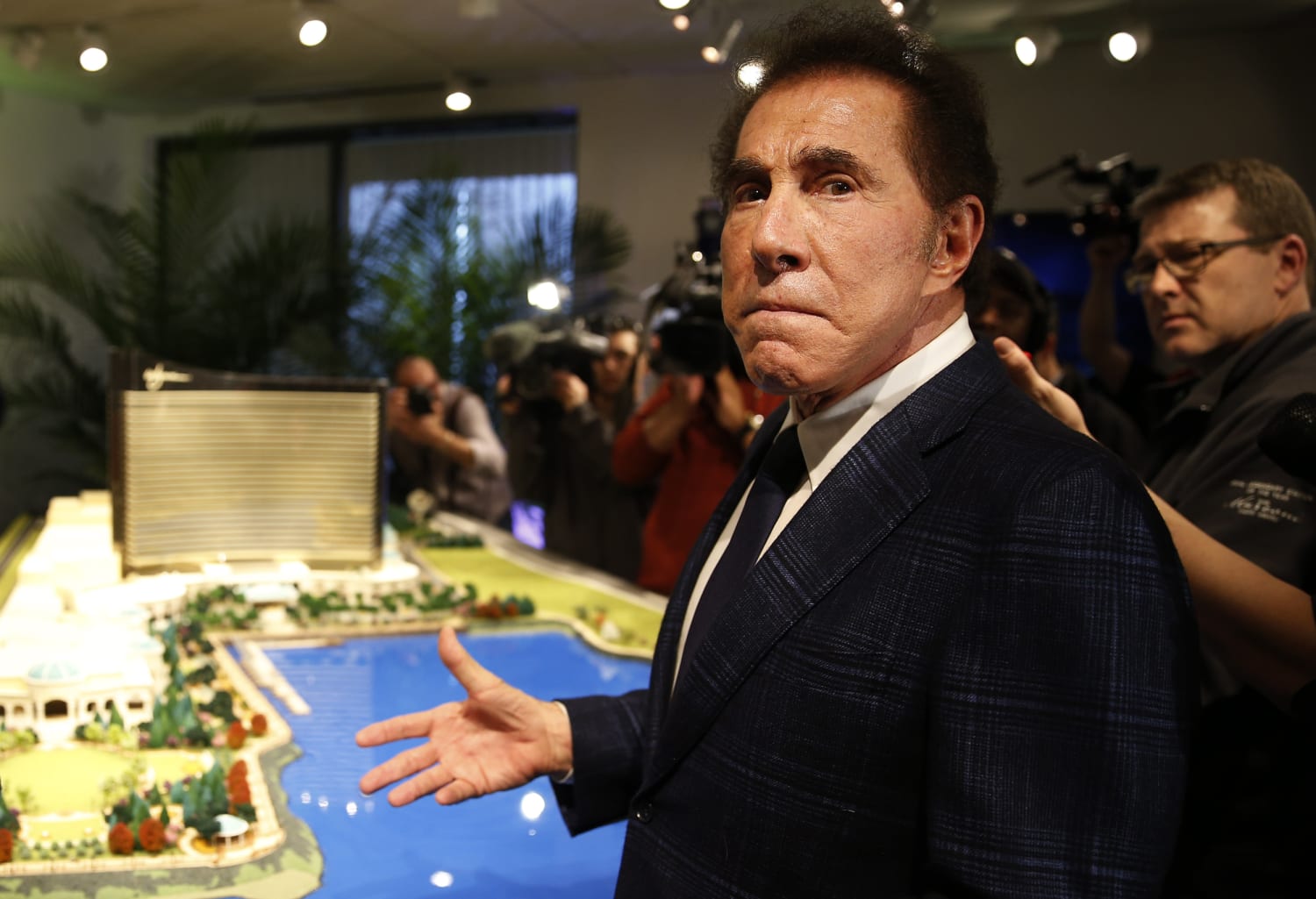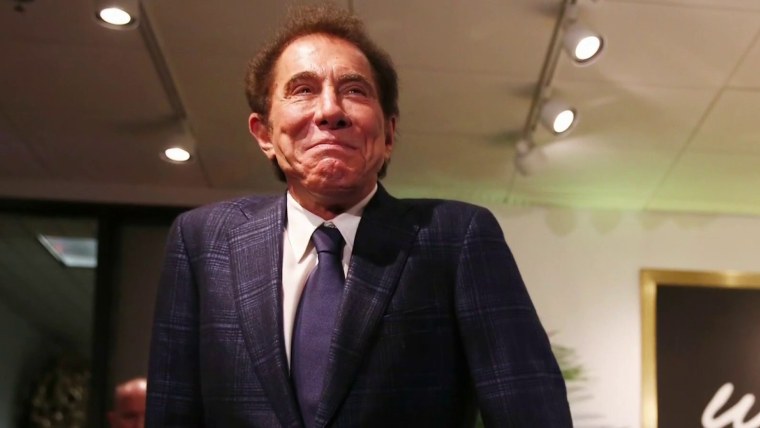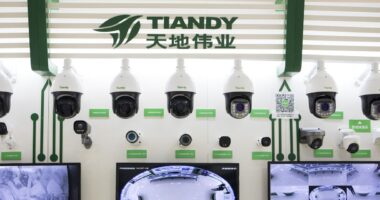Earlier last week, the Justice Department dropped a bombshell allegation against one of the key figures in former President Donald Trump’s circle. According to the Justice Department, billionaire developer Steve Wynn — a man who’s known Trump for years and whoserved as the finance chair of the Republican National Committee during Trump’s first year in office — also worked as a foreign agent on behalf of the Chinese government. As such, the Justice Department is seeking to have Wynn register as a foreign agent.
According to a lawsuit filed by the Justice Department, Wynn used his perch to liaise with other foreign agents working on behalf of China.
According to alawsuit filed by the Justice Department, Wynn used his perch to liaise with other foreign agents working on behalf of China to try to convince Trump to target an unnamed Chinese dissident, including by revoking the dissident’s visa and placing him on the U.S.’s no-fly list. Wynn’s primary contact in the operation was Trump fundraiser Elliott Broidy, who pleaded guilty in 2020 to working as an unregistered agent on behalf of China — and who at one time served under Wynn as the RNC’s deputy finance chair. (Wynn stepped down as RNC finance chair in 2018 following sexual misconduct claims.)
The lawsuit goes into granular detail, highlighting, for instance, multiple text messages between Broidy and Wynn’s wife it says were sent on her husband’s behalf. The fate of the unnamed dissident was a “matter of upmost importance” to Chinese President Xi Jinping, Broidy says in the texts. Wynn also spoke directly multiple times with then-vice minister Sun Lijun on the matter, with the now-former Chinese official asking directly for Wynn’s help. Broidy later texted that Sun was “extremely pleased and said that President Xi Jinping appreciates [Wynn’s] assistance.”
According to the lawsuit, Beijing had every reason to be happy with Wynn’s efforts. Throughout 2017, Wynn pushed Trump multiple times to place pressure on the unnamed dissident, including during “what appeared to be unscheduled meetings” with Trump. At one point, the Justice Department says Wynn called Trump from a yacht off the coast of Italy to discuss the matter. Wynn even roped in Trump’s chief of staff and senior national security council figures. As the Justice Department alleges, Wynn spent months trying to convince Trump — during which he never bothered to register any of his work with the Foreign Agents Registration Act (FARA), the primary U.S. method of disclosing work for foreign regimes.
For reasons that remain unclear, Wynn’s alleged illicit lobbying push eventually proved fruitless, and in late 2017 he asked his contact in the Chinese government to “stop contacting him.” But Wynn’s motivations certainly seem far less mysterious. As the Justice Department describes in the lawsuit, the government in the Chinese city of Macau, where Wynn operates multiple casinos, moved in 2016 to restrict the number of tables and machines available to Wynn, threatening his revenue stream. A few months later, Wynn allegedly began doing Beijing’s bidding — and began directly discussing the fate of his casinos on multiple calls with Sun.
Through his lawyers, Wynn has denied the allegations that he served as a secret foreign agent. However, the fact that the Justice Department has filed a formal lawsuit represents a significant step forward in the U.S.’s efforts to uncover illicit foreign lobbying campaigns. Even with the recent surge in attention on foreign lobbying in the U.S., the suit against Wynn is the first FARA-related civil lawsuit in more than three decades.
It’s not hard to see why the Justice Department resorted to such a drastic measure.
And it’s not hard to see why the Justice Department resorted to such a drastic measure. Since 2018, the department says it told Wynn multiple times that he had to register his lobbying efforts — and every time, the agency says, Wynn refused.
On the one hand, the allegations are shocking. After all, the U.S. government is formally accusing a longtime Trump compatriot, and the man charged with overseeing finances for the Republican National Committee, of secretly working on behalf of a global superpower that is often at odds with American interests. One would think such an allegation would spark a wholesale reckoning among Republican party leadership.
But instead, these allegations have been mostly met with a collective shrug. Perhaps we shouldn’t be surprised. Wynn, after all, is hardly the only member of Trump’s orbit who is accused of having tried to bend the president to another country’s will. Alongside Broidy, Trump’s campaign chair (Paul Manafort) and deputy campaign chair (Rick Gates) were both convicted of illicitly lobbying for a foreign government. The same goes for Mike Flynn, Trump’s first national security adviser, who admitted to secretly working as a foreign agent for Turkey, in addition to taking tens of thousands of dollars from the Kremlin. And Trump’s personal lawyer, Rudy Giuliani, remains under federal investigation for also allegedly working as a foreign agent, after being connected to lobbying efforts from Turkey to Venezuela to pro-Russian forces in Ukraine. (Giuliani has denied the allegations.)
Nor is this the only major news this week regarding illicit foreign lobbyists whispering in Trump’s ear. On Tuesday, federal prosecutors revealed more details about the alleged links between the United Arab Emirates and Tom Barrack, Trump’s major fundraiser and former foreign policy adviser. As the prosecutors in U.S. Eastern District court have alleged, Barrack’s private equity firm received hundreds of millions of dollars from the UAE’s sovereign wealth fund in 2017 — all of it coming at the same time that Barrack was allegedly inserting pro-UAE language into Trump’s speeches, and while Barrack was passing internal White House discussions to his UAE handlers.
Between the charges against Wynn and the new allegations against Barrack, Trump’s administration appears even more open to foreign meddling than was previously thought. And there’s little reason to think we won’t learn more details, and more secret connections, in the near future.
But it’s also clear that with the new lawsuit, the Justice Department is willing to use more tools at its disposal to unearth these networks. It couldn’t come a moment too soon. With Trump eyeing a 2024 run, foreign dictatorships around the world are searching out any opportunity they can find to potentially tilt American policy to their benefit — and to do so, as we saw time and again under Trump’s presidency, without the rest of us knowing.
Source: | This article originally belongs to Nbcnews.com












